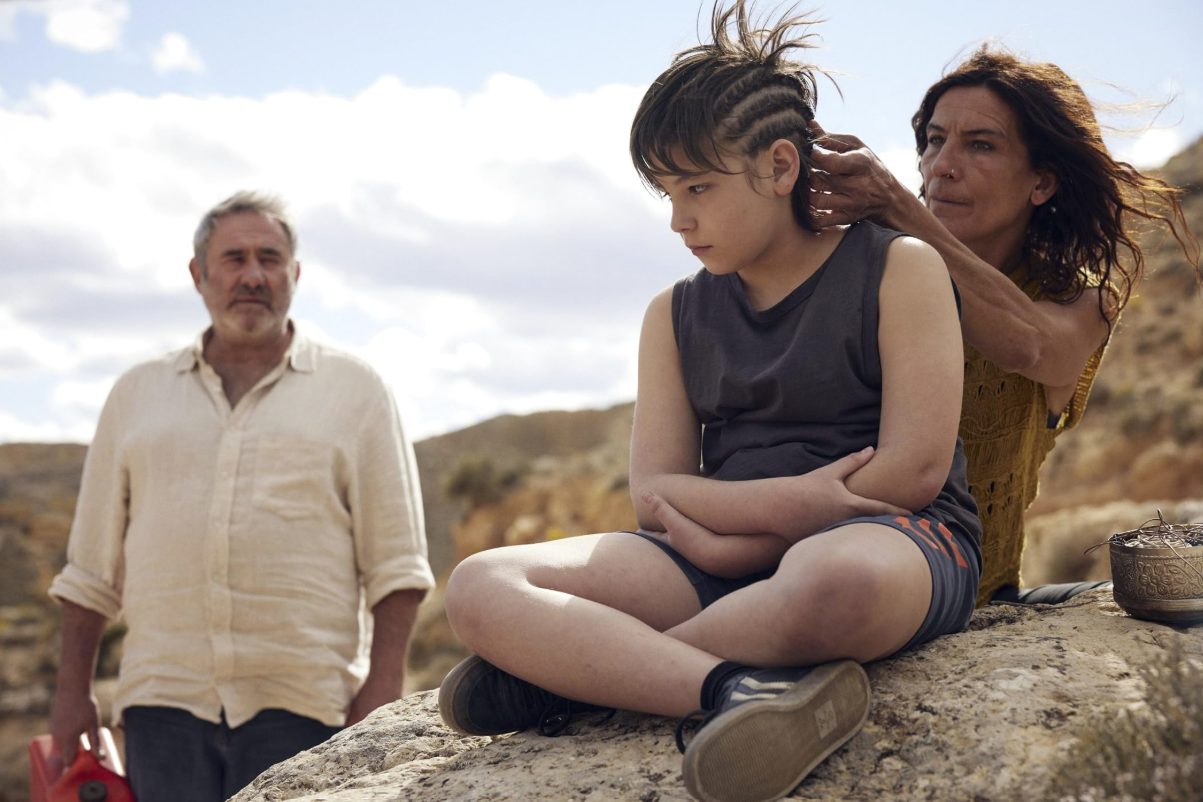In Islam Al-Sirāt is the bridge to paradise that must be crossed on the Day of Resurrection. With the fires of Hell below the bridge will be as narrow as a strand of hair and as sharp as a sword to the unfaithful. The protagonist’s of Oliver Laxe‘s fourth film – a Jury Prize winner at Cannes – find themselves on such a journey, although by the time they realise it it’s too late.
A father, Luis (Sergi López), hands out flyers bearing the face of his missing daughter at an illegal rave in the Moroccan desert. Following a tip that she may be here, he’s brought his young son Esteban (Bruno Núñez) to help. She’s nowhere to be found, but a motley group of ravers, Stef (Stefania Gadda), Jade (Jade Oukid), Josh (Joshua Liam Henderson), Bigui (Richard Bellamy), and Tonin (Tonin Janvier), are planning to head South to another gathering in Mauritania and say she may possibly be there. When the army arrives to break up the rave, Luis and Esteban tag along with the group.
Right from the opening scene, Sirāt sucks the viewer into the ravers’ world. This really is a film that demands to be seen on a big screen with a hefty sound system. Driven by Kangding Ray‘s minimalist techno, there’s a real sense of the ritualistic, primal energy. We’re introduced to the characters, lost in the music, the real world (with its implied military unrest) is banished for the moment. It’s a scene of pure dopamine, a perfect mix of sound design and the panorama of the desert, with great parched cliff faces looming ominously over the dancers.
From this scene of utopia interruptus, we’re into road movie territory, with Luis and Esteban absorbed into this surrogate family of outcasts, weathered and maybe slightly warped by their lives as peripatetic techno nomads. It feels like we’re in for a philosophical, vibes-heavy jaunt, with an edge for sure, but a largely benign experience. That is until the little caravan of vehicles encounters narrower and narrower terrain and suddenly it’s The Wages of Fear and the tension ratchets up exponentially. And then things get brutal.
There is a very definite switch in tone that occurs very suddenly, and it’s here that audiences are sure to be divided. Laxe jettisons the initial plot, that of finding Luis’ daughter, in favour of a sustained and unspeakably tense period of anticipation and dread. Most nihilistically, even the panacea of the music becomes a site of violence, along with a Miltonian sense of a paradise – even a fleeting one – lost. It feels like so much of the film’s subtext and thematic ideas are knowingly strewn across the desert floor. The message, when harking back to the opening scene, seems to be, ‘Man makes plans and God laughs’. Powerful and expertly staged? For sure. Empty shock value? Arguable, but a case can certainly be made.
Sirāt has drawn comparisons to such films as Mad Max: Fury Road in its apocalyptic tone and desert setting. What it really echoes in its confrontational switch of tones is the likes of Bruno Dumont‘s Twentynine Palms and Catherine Breillat‘s Fat Girl, in the use of shattering explosions of violence that reconfigure (for better or worse) everything that has gone before. It’s been chosen as Spain’s entrance for best international film Oscar, largely thanks to its Spanish producers, including Pedro Almodovar. It seems a long shot as the Academy prefers their harrowing fare to come with a neat moral bow, in which Sirāt has no interest in tying round itself. It is absolutely an experience to be witnessed on the big screen. Even if you hate it, it’s unlikely to be forgotten in a hurry.
Screened as part of French Film Festival UK


Comments